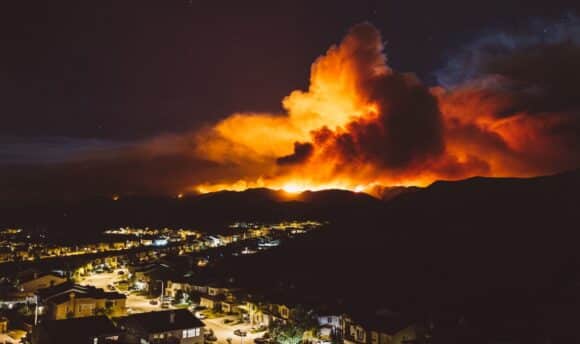What if the banking, asset-management, and insurance industries moved away from fossil fuels?
(Below is an excerpt from Bill McKibben’s essay published September 17, 2019. The full essay can be found here.)
In some ways, the insurance industry resembles the banks and the asset managers: it controls a huge pool of money and routinely invests enormous sums in the fossil-fuel industry. Consider, though, two interesting traits that set insurance apart.
The first is, it knows better. Insurance companies are the part of our economy that we ask to understand risk, the ones with the data to really see what is happening as the climate changes, and for decades they’ve been churning out high-quality research establishing just how bad the crisis really is. “Insurers were among the first to sound the alarm,” Elana Sulakshana, a RAN campaigner who helps coördinate the Insure Our Future campaign for a consortium made up mostly of small environmental groups, told me. “As far back as the nineteen-seventies, they saw it as a risk.” In 2005, for instance, Swiss Re, the world’s largest reinsurance company, sponsored a study at the Center for Health and the Global Environment, at Harvard Medical School. The report predicted that, as storms and flooding became more common, they would “overwhelm the adaptive capacities of even developed nations” and large areas and sectors would “become uninsurable; major investments collapse; and markets crash.” As a result of cascading climate catastrophes, the day would come when “parts of developed nations would experience developing nation conditions for prolonged periods.” In April, Evan Greenberg, the C.E.O. of Chubb, the world’s largest publicly traded property and casualty insurer, said in his annual statement to shareholders that, thanks to climate change, the weather had become “almost Biblical” and that “given the long-term threat and the short-term nature of politics, the failure of policy makers to address climate change, including these issues and the costs of living in or near high-risk areas, is an existential threat.” To its credit, Chubb soon took a step that no other big U.S. insurer has managed, and announced that it was restricting insurance and investments in coal companies. But it still invests heavily in oil and gas, and so does virtually every other major insurance company.
The second thing that makes insurance companies unique is that they don’t just provide money; they provide insurance. If you want to build a tar-sands pipeline or a coal-fired power plant or a liquefied-natural-gas export terminal, you need to get an insurance company to underwrite the plan. Otherwise, no one in his right mind would invest in it. “You can’t even survey a pipeline route without some kind of insurance,” said Ross Hammond, a senior strategist with the Sunrise Project, which began looking at the insurance industry in 2016, while fighting plans for an Australian coal mine. “If you have a crew in the field, they need to be covered, Hammond said. “They break their ankle, they’re going to sue somebody.”
The insurance industry, in other words, has become the perfect embodiment of the axiom, attributed to Lenin, that “the last capitalist we hang shall be the one who sold us the rope.” (In fact, for a price, it would protect you against the risk that the rope might break.) James Maguire, before he joined a renewable-energy investment and advisory firm, spent the past quarter century as an insurance broker, much of that time in Hong Kong, where he led teams arranging reinsurance for vast fossil-fuel power plants. There’s no way they can be built without insurers, he explained: “You want to build a power plant in Vietnam? We’d get a lead insurer in Vietnam, and then arrange the reinsurance behind it. You could have twenty different companies involved.” And if a bunch of those companies, in essence, were to go on strike, refusing to underwrite new fossil-fuel projects? “Things would absolutely slow,” he said. “A project is typically not bankable until it is insurable.” Just as Exxon might be able to survive without bank financing, and might be able to buy back its shares if BlackRock put them on the market, it and a few other giant companies might be able to self-insure their ventures. But “it would absolutely create a more challenging financial process,” Maguire said. Insurance is so ingrained in our economy that it could work the same trick from many different angles—Mark Campanale, who directs the London think tank Carbon Tracker Initiative, says that just limiting the standard indemnity policies that cover a company’s officers and directors, to exclude coverage for those who don’t take climate change seriously, would be a big step. Insurance implies caution—but, in a rapidly deteriorating world, our only chance may be bold action. “There was five feet of hail in Guadalajara ten days ago,” Maguire said, when we spoke in July. “No company had a model that predicted that.”



